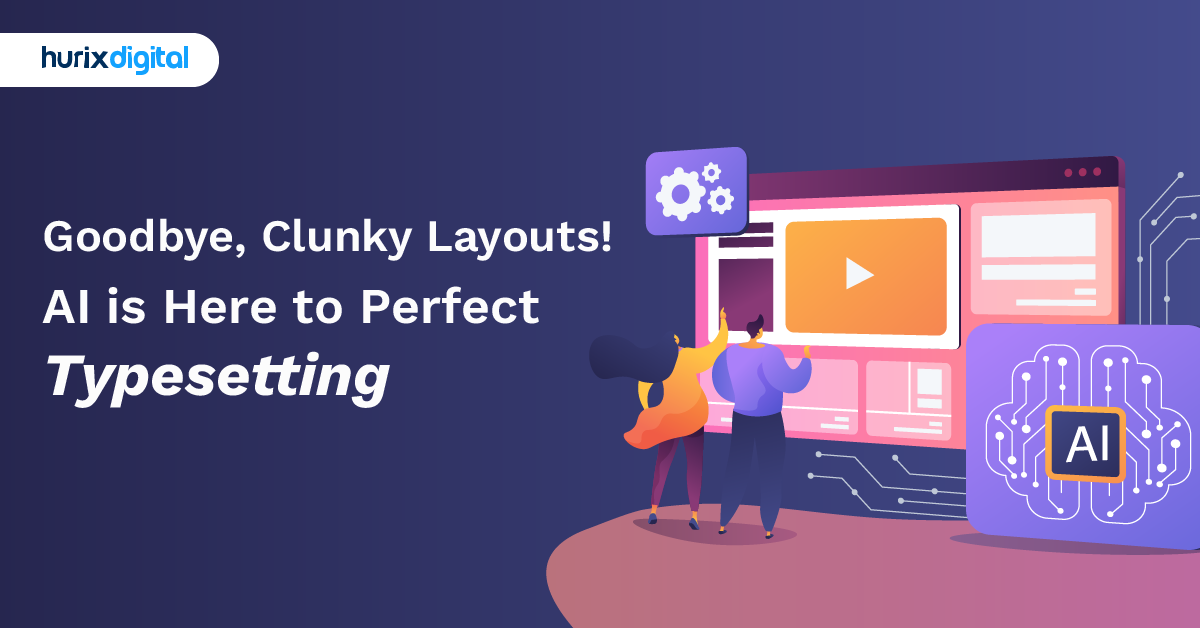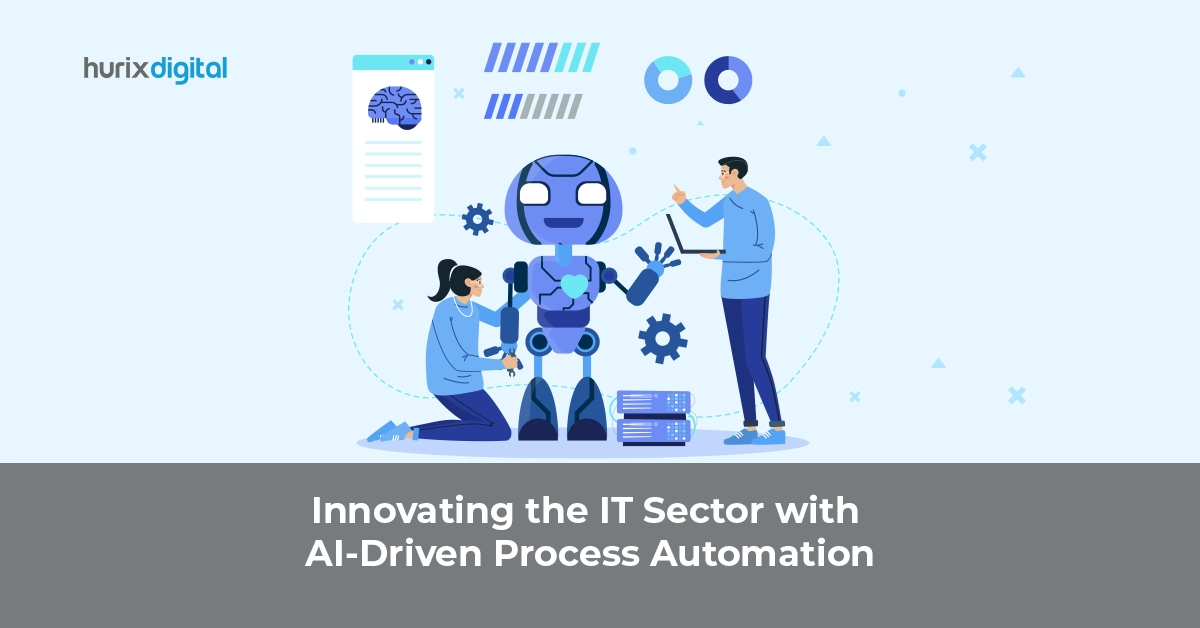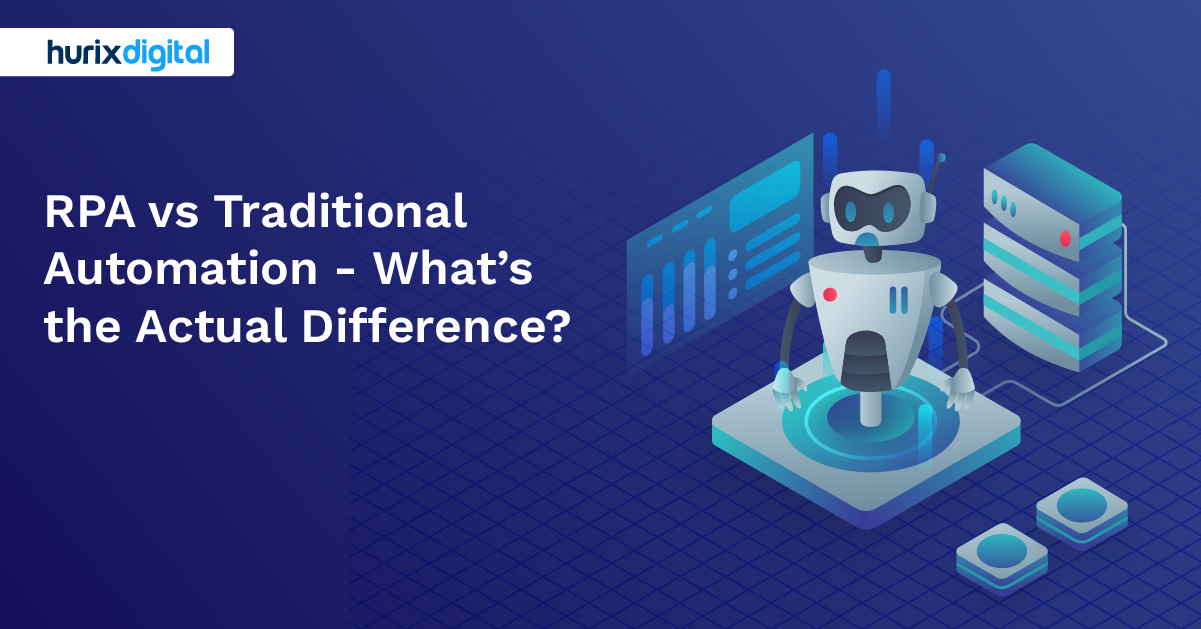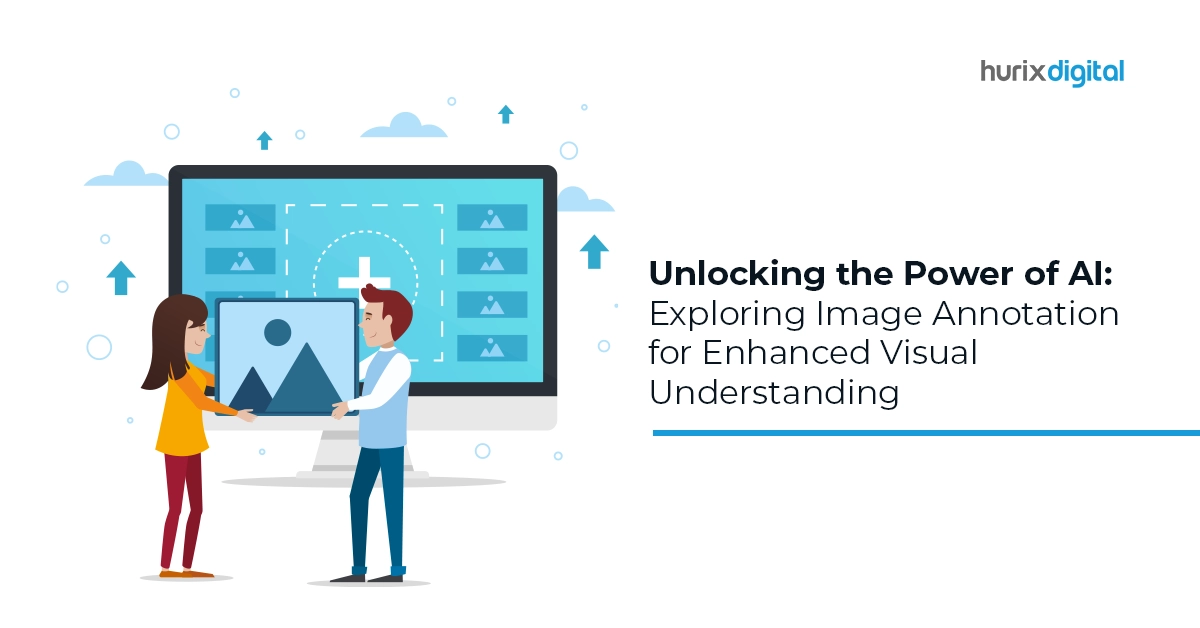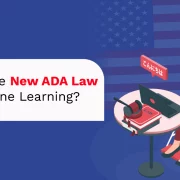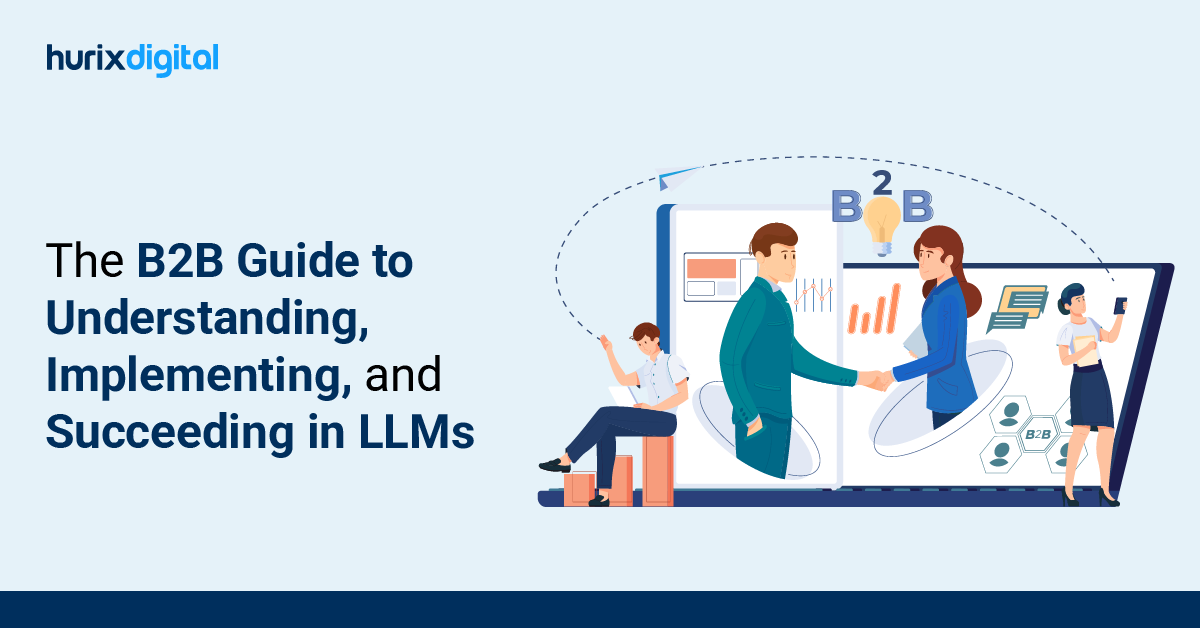
How Large Language Models Are Transforming B2B and Enterprise Innovation?
Large language models (LLMs) are advanced tools that help businesses in many ways. They improve products, simplify day-to-day tasks, and increase productivity.
A study by Verta, Inc. indicated that companies plan to continue or increase their investments in the broad adoption of AI. Moreover, ML spending has increased by almost 230% in the last five years (2019–2023), according to a report by Juniper Research.
Large language models play a crucial role in communication enhancement and B2B integration in enterprise applications. They provide AI-driven solutions for business communication, streamlining procedures, and improving universal efficiency. Some noteworthy examples of large language models include LLama, GPT-3, GPT-4, BloombergGPT, Codex, Falcon, Chinchilla, Gopher, and BERT.
In this post, we’ll explore different types of LLMs and discuss their applications in B2B settings. Let’s get started!
Table of Contents:
- What is Generative AI?
- Different Types of Large Language Models (LLMs)
- The Rise of LLMs
- Understanding LLMs In-Depth
- Benefits of Private LLMs for Enterprises
- The Synergy of Gen AI and Private LLMs
- Why Do You Need Large Language Models for Business Innovations?
- Combining the Power of LLMs and Advanced AI
- LLMs Are Multi-Talented Systems
- Leveraging the Power of AI to Engage Customers
- Customizing LLMs for Maximum Efficiency
- LLMs Are More Interactive than Traditional Search Engines
- LLMs Are User-Friendly Installations
- LLMs Empowers Decision-Making
- Survival Kit for a Competitive Market
- Using the LLMs to Craft Content
- How Large Language Models Enhance Your B2B Content Marketing?
- Conclusion
What is Generative AI?
Let’s start by exploring what is generative AI (Gen AI).
Gen AI is simply a type of AI that uses machine learning and natural language processing algorithms to create entirely new data, such as images, text, code, or even music. With just a few simple prompts, you can tell this private AI model to perform certain activities, and it can give you quick results that were humanly impossible.
Gen AI models achieve this by analyzing massive datasets of existing content. They learn the underlying patterns and relationships within this data, allowing them to generate new content that mimics the style and characteristics of the training data.
This opens a world of opportunities in various industries, such as:
- Marketing: Using AI to do market research, analyze trends, and generate accurate reports
- Writing: Write blogs, generate personalized ad copy, create product descriptions, or craft engaging social media content
- Product Development: Write code, improve development processes, and help build innovative products
- Education: Gen AI in education can be used to create simple assessments, interactive quizzes, or multiple-choice questions to help assess students’ knowledge or be used or answer student questions
The possibilities with Gen AI are truly endless!
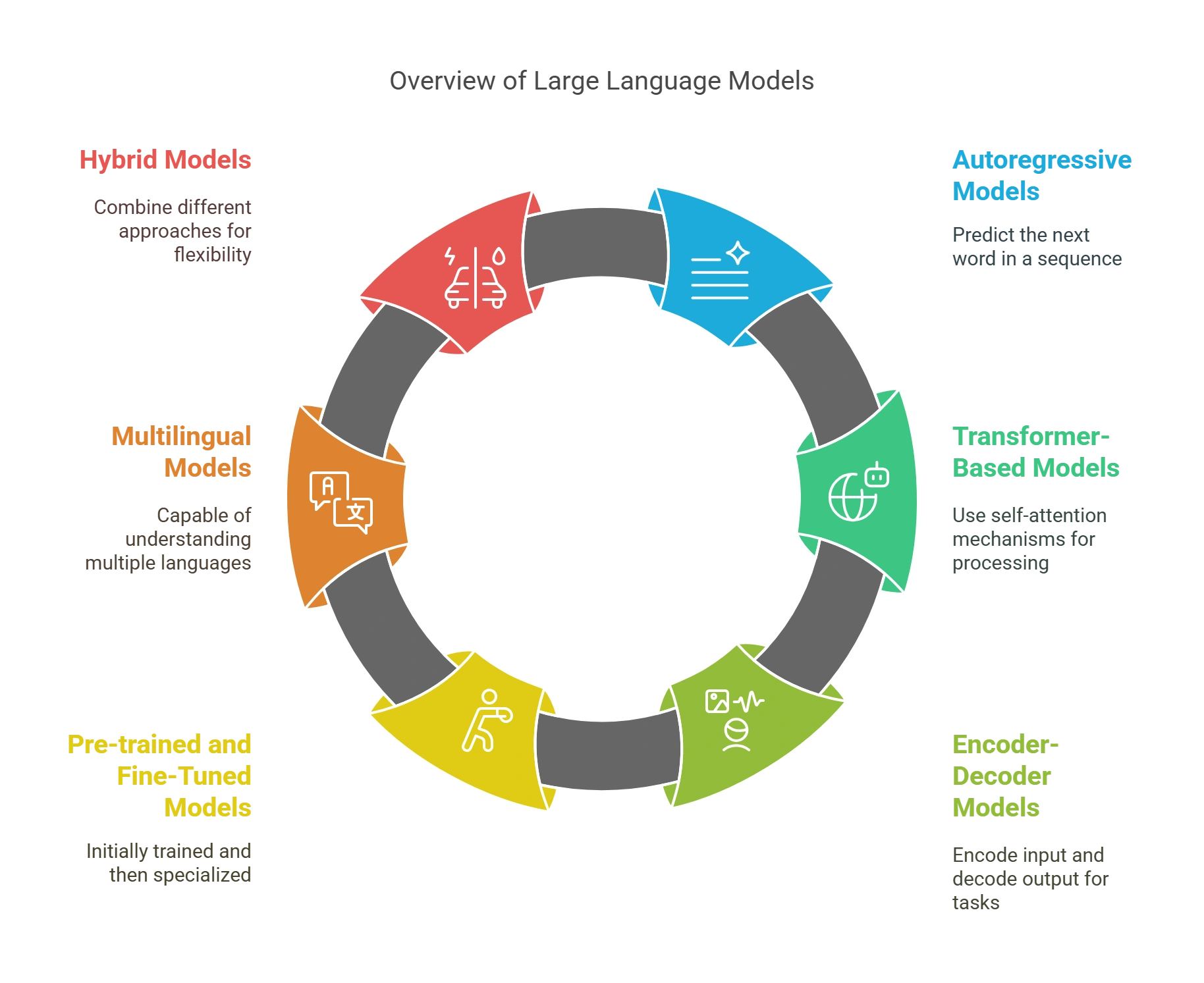
Different Types of Large Language Models (LLMs)
In natural language processing (NLP), LLMs are classified based on different criteria.
Below are some of the popular types of LLMs:
1. Autoregressive Language Models
These models predict the next word based on the previous words in a sequence. GPT-3 is one of the best examples of aggressive language models. They excel at producing consistent and relevant text but can be slow and may produce redundant or off-topic responses.
2. Transformer-Based Models
Large language models (LLMs) rely on transformers, a fundamental architecture in deep learning. Introduced by Vaswani and colleagues in 2017, transformers quickly became a cornerstone in many LLMs.
What makes transformers so powerful is their ability to efficiently process text by understanding distant relationships and contextual information. This architecture enables LLMs to excel in tasks such as text creation with remarkable accuracy and coherence.
3. Encoder-Decoder Models
Encoder-decoder models are popular for tasks such as answering questions, machine translation, and summarization. These models have two main parts:
- An encoder that processes the input sequence
- A decoder that generates the output sequence
The encoder creates a fixed-length representation of the input sequence, which the decoder makes use of to create the output sequence.
Transformers, like RoBERTa and MarianMT, follow this structure.
4. Pre-trained and Fine-Tuned Models
A common approach to tasks such as sentiment analysis or named entity recognition is to use large language models pre-trained on large amounts of data. This allows models to recognize common language structures and meanings.
Smaller task-specific data sets can then be used to fine-tune these pre-trained models for particular tasks or domains. Through this process of optimization, the model performs better for a given task. As a result, it is quicker and more effective than creating a huge model from scratch for every project.
5. Multilingual Models
Trained in multiple languages, these models can understand and produce text in various languages. They can share knowledge across languages, benefiting tasks like translation and multilingual chatbots. Examples include XLM by Facebook AI Research.
6. Hybrid Models
These models combine transformers and recurrent neural networks (RNNs) for better performance. RNNs process sequential data, supporting the transformers’ self-attention features. UniLM is an example of a hybrid model.
The Rise of LLMs
The advent of LLMs has revolutionized how businesses interact with information and users. AI and deep-learning techniques are the most common approaches for new data science applications.
LLMs, powered by advanced algorithms and vast amounts of data, are at the forefront of this revolution, offering capabilities that range from automating customer service to generating insightful reports.
As we explore artificial intelligence (AI) for business, it’s crucial to understand the significance of LLMs. These models, such as OpenAI’s GPT (Generative Pre-trained Transformer), have demonstrated proficiency in various tasks, including—but not limited to—language translation, content creation, and even coding.
The versatility of LLMs makes them invaluable assets for business automation with LLMs, enabling companies to streamline operations and enhance productivity.
Understanding LLMs In-Depth
Before implementing LLMs, it’s essential to grasp their underlying mechanics and capabilities. At the core, an LLM runs on an algorithm trained on vast amounts of text-based data. This training enables them to perform a wide range of NLP (Natural Language Processing) tasks with remarkable accuracy.
Moreover, an LLM can acquire new skills, such as drafting presentations or writing code, by analyzing this extensive dataset. Aside from ChatGPT, other examples of LLM-powered AI include Google’s Bard, Microsoft’s Bing, and Meta’s LLaMa.
LLMs such as GPT-3 utilize a transformer architecture, allowing them to process words about all other words in a sentence, thereby capturing the context more effectively than previous models. This architectural advancement is a critical factor in the models’ ability to understand and generate human-like text.
On the other hand, evaluating the performance of LLMs is crucial for ensuring their effectiveness in business applications. Metrics such as BLEU (Bilingual Evaluation Understudy) for translation tasks and ROUGE (Recall-Oriented Understudy for Gisting Evaluation) for summarization tasks are commonly used to assess model performance.
Additionally, real-world testing and feedback loops are essential for fine-tuning models to specific business needs.
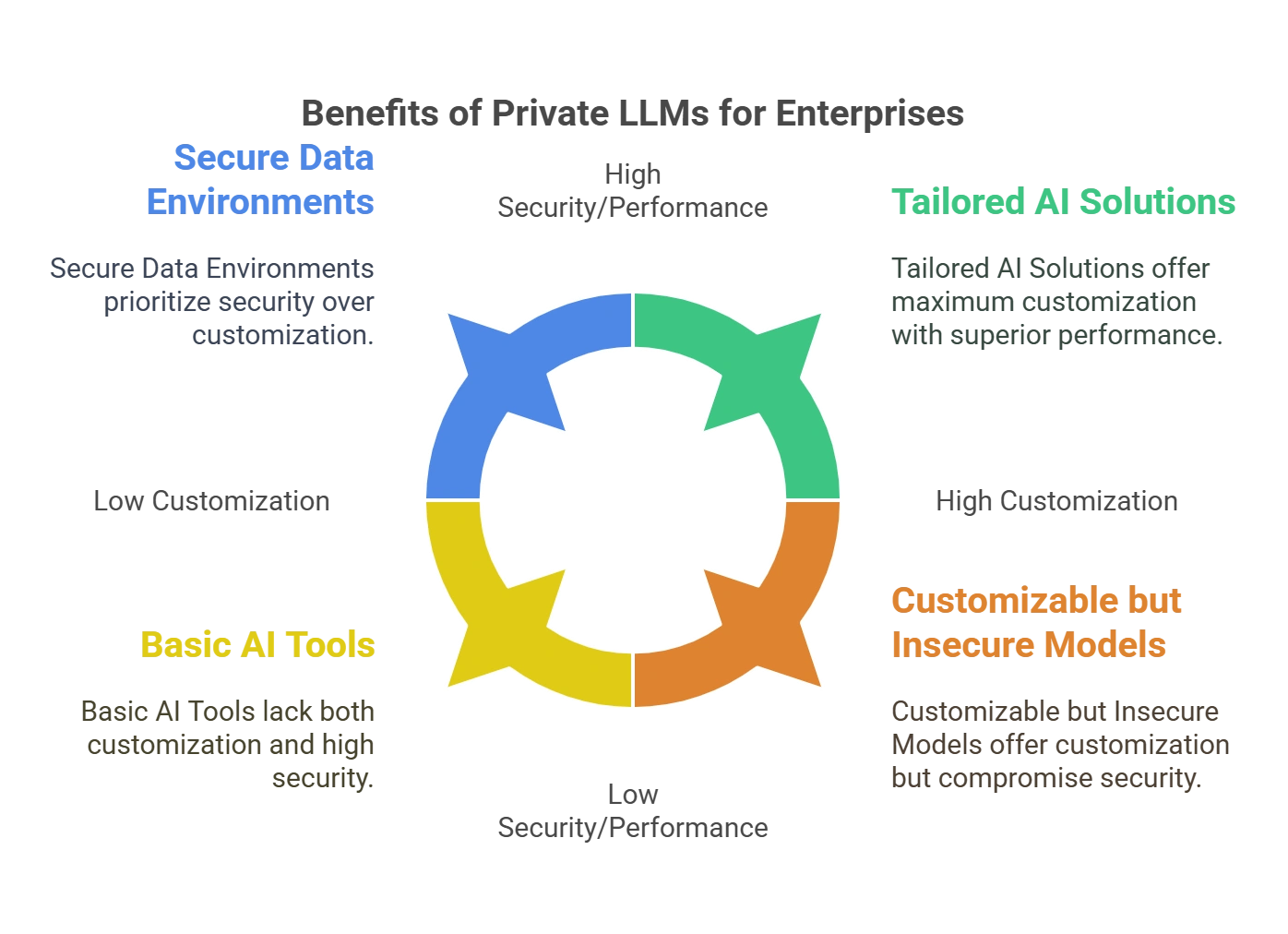
Benefits of Private LLMs for Enterprises
By leveraging this private data, Private LLMs offer several key advantages:
1. Enhanced Data Security
Since training happens exclusively on the company’s data, there’s no risk of sensitive information leaking or being exposed to unauthorized parties. This ensures compliance with data privacy regulations and protects the company’s intellectual property.
2. Improved Model Performance
By training on domain-specific data, Private LLMs become highly specialized in understanding the company’s unique needs and language. This leads to a significant improvement in model performance, generating outputs that are more relevant and accurate for the specific enterprise context.
3. Greater Customization
The ability to train on private data allows for extensive customization of the LLM. Companies can tailor the model to recognize specific terminology, understand internal processes, and generate content that aligns perfectly with their brand voice.
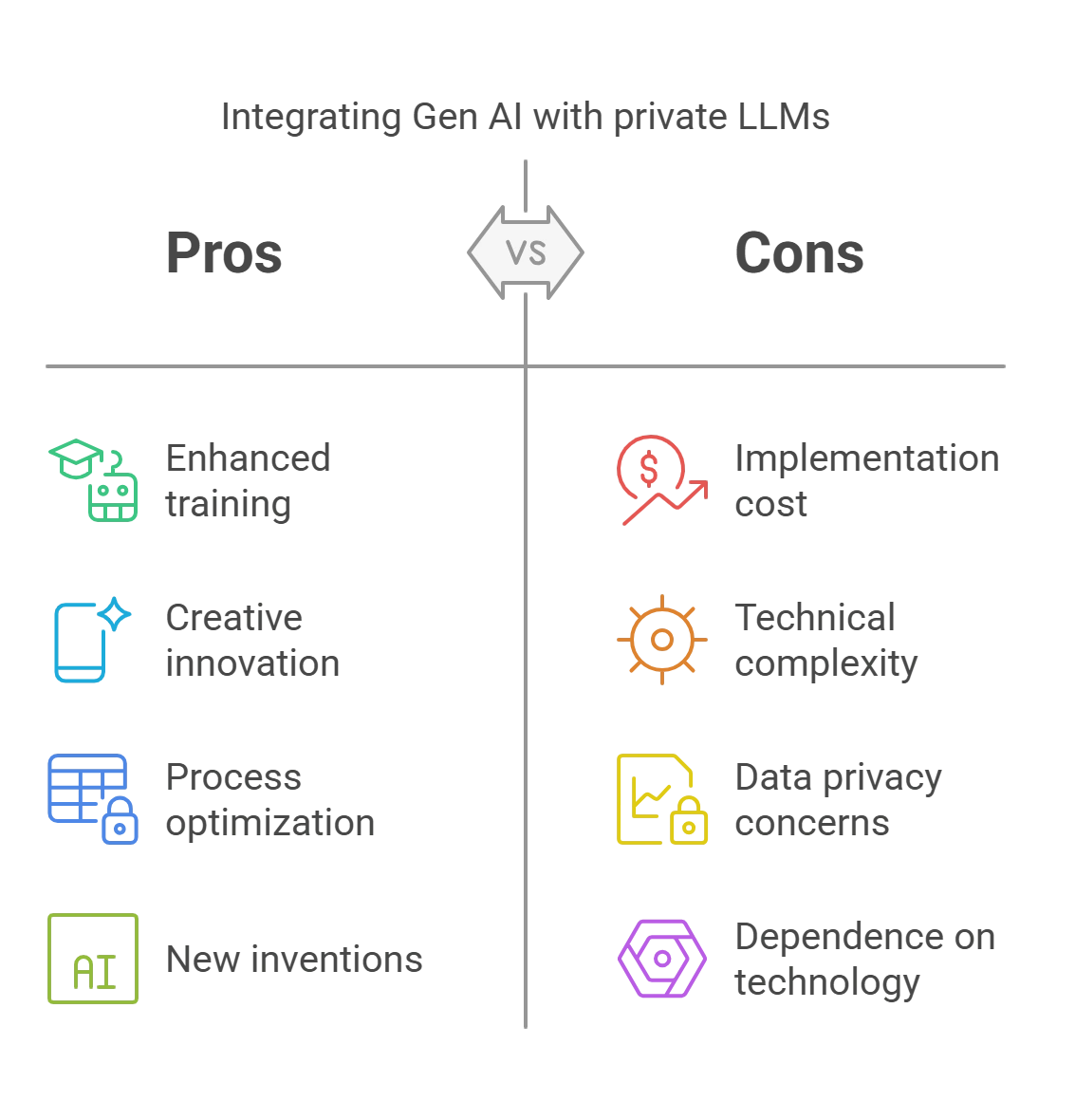
The Synergy of Gen AI and Private LLMs
As you have seen, with Private LLMs, enterprises can truly harness the power of Gen AI while maintaining complete control over their data, a big challenge with public LLMs. This ensures the highest level of security and makes it ideal for use for enterprise needs.
With Private LLM + Gen AI, organizations can unlock a treasure trove of possibilities, such as:
1. Use It to Train Gen AI Models
Private LLMs can be used to train Gen AI models. By training on a company’s private data, the LLM understands the enterprise’s specific needs, language, and brand identity. This sets the stage for Gen AI to operate within a secure and relevant context.
2. Unleash Creative Potential
Leveraging the insights gained from the LLM, Gen AI can generate innovative ideas and content tailored to the enterprise’s unique requirements. This could involve:
- Personalized Customer Experiences: Generate targeted marketing campaigns, create chatbots that understand customer queries, or personalize product recommendations.
- Content Creation at Scale: Develop unique product descriptions, write engaging blog posts, or craft social media content that resonates with the target audience.
- Accelerated Product Development: Generate novel product ideas, prototype designs, or analyze customer data to identify potential market gaps.
3. Optimize Internal Processes
Gen AI and Private LLMs can automate repetitive tasks, analyze data to identify hidden inefficiencies, and even predict potential problems before they occur. This frees up valuable human resources for more strategic endeavors while optimizing workflows and reducing operational costs.
4. Create New Innovations
Imagine moving beyond incremental improvements and venturing into entirely new territories. Companies can explore uncharted innovation landscapes by leveraging Gen AI’s ability to generate novel ideas and concepts, coupled with the domain-specific understanding of Private LLMs.
This could lead to the creation of groundbreaking products and services that address unmet customer needs or disrupt existing markets altogether.
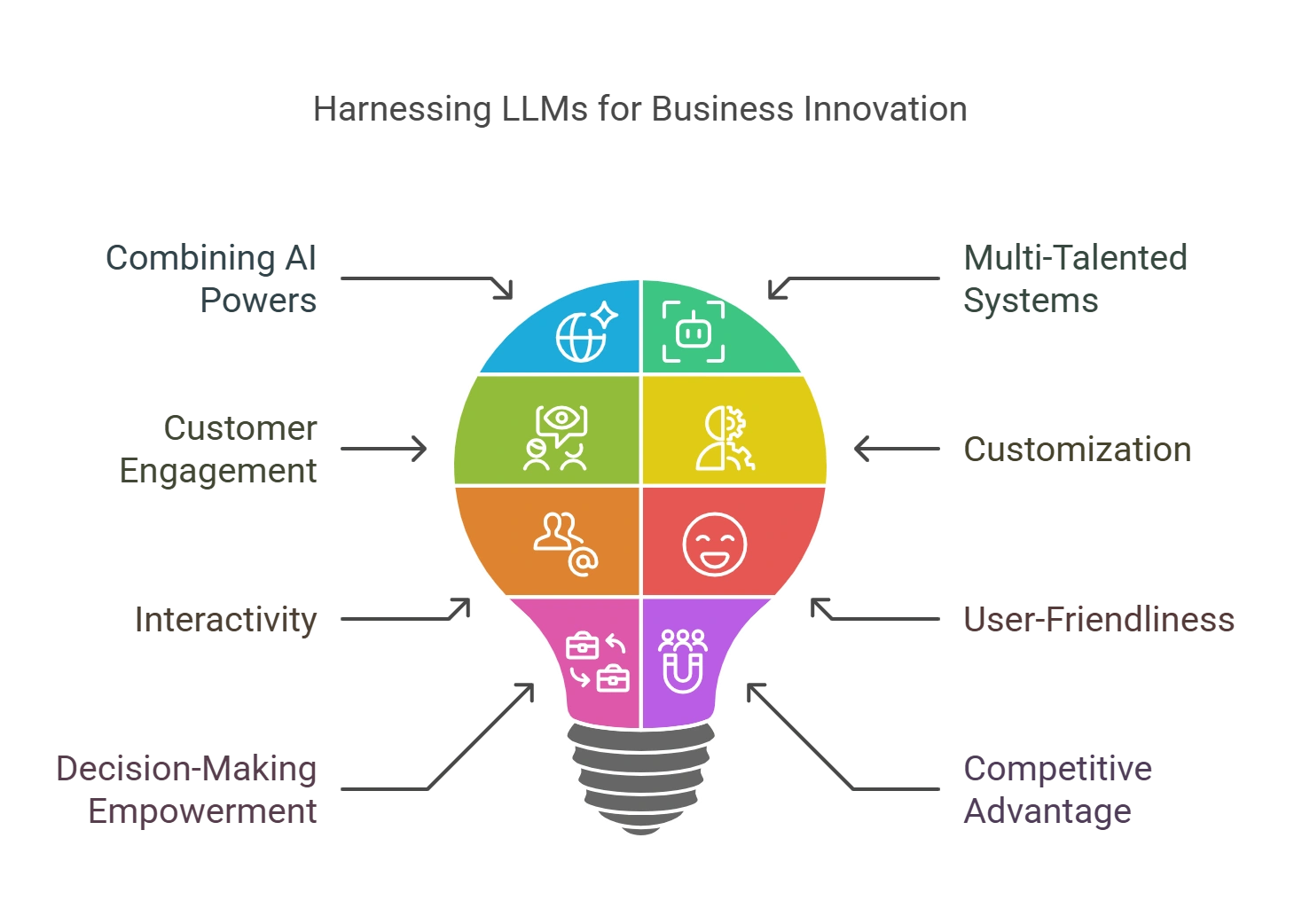
Why Do You Need Large Language Models for Business Innovations?
The following are the top 9 takeaways about Large Language Models and their effects on businesses:
1. Combining the Power of LLMs and Advanced AI
The introduction of Artificial Intelligence in the business sector has revolutionized how the entire industry functions. Previously, AI managed only the necessities surrounding the business sector, such as automating routine tasks to reduce redundancy of work for employees.
However, with the introduction of Large Language Models (LLMs), AI could now leverage its power to construct human-like texts and handle basic responsibilities without human supervision. LLMs have enabled AI to automate processes, give problem-solving insights, interact with customers, and personalize the e-commerce industry for dedicated shopping experiences.
2. LLMs Are Multi-Talented Systems
Previously, LLMs were limited only to basic chatbots. Over the years, improved LLM technology has enabled it to go beyond automated customer services in the business sector.
For example, LLMs help with coding. They can generate code snippets, debug, and translate programming languages.
Similarly, LLMs have now unlocked computer vision and are used as efficient workforces in hardware products like speakers and wristbands, robotics, recruitment industries, and finance sectors.
3. Leveraging the Power of AI to Engage Customers
Reports reveal that 35% of customers enjoy the AI interactive process for assistive shopping and browsing, which helps them find new things. With the introduction of AI in e-commerce, customers are more engaged in their shopping experiences, and the personalization of e-commerce appeals to them.
Large Language Models (LLMs) have human-like conversational skills, and provide customers with assistance and solutions, leading to increased customer satisfaction. With the ease and convenience of shopping, smooth transactions, and responsive automated customer care service, LLMs enhance the overall customer experience.
4. Customizing LLMs for Maximum Efficiency
With tailored and customized LLM models, businesses generate innovative and transformative solutions that handle specific customer requirements. With enhanced accuracy and a defined workflow niche, customized LLMs potentially uplift customer experiences.
Furthermore, customization allows for more streamlined workflows and clear goals that align with businesses. Customized LLMs are incorporated in Retail and e-commerce, Marketing and advertising, telecommunications, and Consultation services.
5. LLMs Are More Interactive than Traditional Search Engines
LLMs are skilled at understanding the context of queries, as they have been studying enormous amounts of data. As a result, their outputs are more accurate and personalized to fit the context.
Traditional search engines are facing tough competition as Large Language Models (LLMs) can summarize, comprehend, and deliver information in a more consumable format for the user. In businesses, this ability allows efficient knowledge management systems, enhanced information retrieval, and the ability to make reasonable decisions.
6. LLMs Are User-Friendly Installations
Businesses are eager to incorporate LLMs into their workforce, as the model has been designed to integrate hassle-free operations easily.
With this access to a massive AI model, businesses can incorporate LLMs into CRM models, workflow tools, and similar systems. This facilitates high-quality data processing, enhanced customer care and query solutions, efficient statistics generation for comprehending business trends and patterns, and informed decision-making.
Business sectors, powered by massively architected LLM systems, now have the upper hand to innovate, advance, and elevate their performance in a competitive scenario.
7. LLMs Empowers Decision-Making
LLMs can analyze massive datasets, trends, key patterns, and customer journeys to form deeper insights, make more informed decisions, and stay ahead of the competition.
With such tailored insights, businesses can make confident and actionable goals based on high-quality data, study risk assessments, and cater more efficiently to diverse customer requirements. For example, LLM applications in industry can produce valuable reports on company performance by analyzing customer reviews, survey responses, and feedback.
8. Survival Kit for a Competitive Market
Large Language Models (LLMs) deliver customization, high-quality data reports, tailored insights on business trends, innovative customer personalization approaches, and the ability to uplift the overall quality of your business.
These factors drive you ahead in the competition, and your business flourishes with the constant assistance of LLM-powered AI models. By leveraging LLM technology, businesses can optimize and streamline workflows, global operations, and end-user experiences.
9. Using the LLMs to Craft Content
LLMs have strong data analysis systems that can understand and mimic human language. This makes the model capable of producing any information, such as blogs, articles, whitepapers, or creative writing.
LLMs provide businesses with high-quality content that adapts to a brand image and style and delivers systematic language across omnichannel. Moreover, by analyzing consumer behavior patterns, market trends, and statistics, the content delivered is highly effective and influential for business workflows.
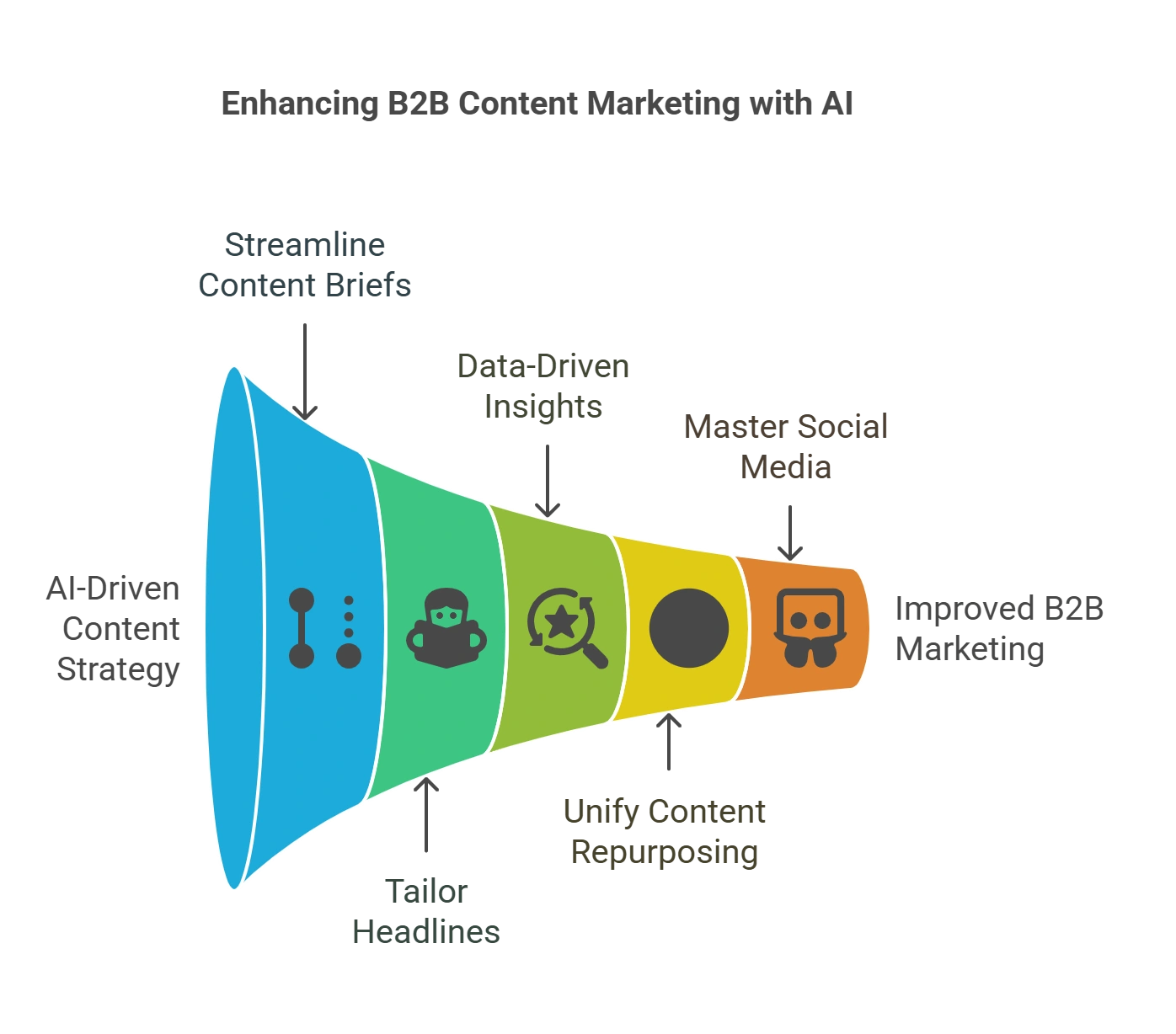
How Large Language Models Enhance Your B2B Content Marketing?
Fueled by vast data and sophisticated algorithms, Large Language Models (LLMs) can process information, identify patterns, and even generate creative content, bridging the gap between machine intelligence and human communication.
1. Streamlining Content Briefs with AI
Large Language Models (LLMs) offer a powerful tool to elevate B2B content marketing by revolutionizing the content briefing process.
These AI-powered systems leverage vast data reserves to generate comprehensive and strategic briefs, saving time and effort while ensuring alignment with audience expectations and brand goals.
Here is how LLMs streamline content brief creation:
- Automatic Outline Generation: LLMs can analyze past successful content and current market trends to create detailed outlines. It eliminates manual brainstorming and structuring, freeing up valuable time for strategizing and enhanced content generation.
- Targeted Audience Insights: LLMs can help define your target audience by analyzing demographics, interests, and online behavior. This ensures the brief reflects the audience’s needs and preferences, leading to more engaging and relevant content.
- Optimized Keyword Integration: LLMs understand the nuances of search engine optimization (SEO) and can identify relevant keywords for strategic integration into the brief. It ensures the content is discoverable through online searches, driving higher organic traffic and leads.
- Consistent Brand Voice and Tone: LLM applications can analyze your brand assets and communication style to suggest a consistent tone and voice for the content. This ensures brand recognition and strengthens audience trust, fostering long-term relationships.
- Efficient Project Kick-Off: LLMs enable efficient project kick-offs for content creators by providing a comprehensive and well-structured brief. This reduces the time spent on clarification and revisions, leading to enhanced content generation and quicker time to market.
2. Tailor Headlines for Maximum Impact
B2B marketers can access vast data with large language models (LLMs), empowering them to create engaging and relevant headlines tailored to the specific nuances of their industry and target audience.
LLMs go beyond simple keyword suggestions, delving deeper to understand the structure and context of successful headlines. This enables them to generate fresh, impactful variations that resonate with specific demographics.
Through analysis of past performance and industry shifts, LLM technology refines headlines to maximize click-through rates and engagement, propelling B2B content to new levels of effectiveness.
3. Data-Driven Insights for SEO Success
LLMs have become the game-changers in B2B keyword research, allowing marketers to develop content that perfectly balances ranking high in search results and deeply connecting with their target audience.
- Data Analysis: LLMs scour vast data sets, swiftly identifying high-performing keywords beyond popular choices. This ensures content targets the right audience while aligning with industry trends and competition.
- Strategic Keyword Placement: LLM technology goes beyond mere keyword identification to guide optimal placement within content. This balances SEO best practices with user engagement and readability, maximizing content visibility and organic traffic.
- Enhanced Content Visibility: LLMs facilitate B2B content optimization for search engines, propelling it higher on SERPs. This increases organic traffic, attracts qualified leads, and drives content marketing effectiveness.
- Trend Prediction and Adaptation: LLMs predict search trends and user behavior shifts, allowing marketers to create content that stays relevant over time. This ensures long-term SEO success and a competitive edge.
4. Unify Content Repurposing
Large Language Models (LLMs) are allies in B2B content marketing, facilitating efficient and impactful content repurposing strategies. Here is how:
- Effortless Transformation: LLMs can transcribe audio and video content into written formats (e.g., blog posts and memes) with remarkable speed and accuracy. It provides valuable insights and expands content reach beyond its initial format.
- Multi-Platform: LLMs generate video scripts from existing content, enabling seamless adaptation to visual mediums. Additionally, audio voiceovers can be extracted for podcast distribution, maximizing content coverage.
- Social Media: LLMs intelligently rewrite content into bite-sized social media posts and email sequences, ensuring brand messaging resonates across diverse platforms. They can also summarize relevant external content, enriching your social media presence.
- Unified Campaign Creation: B2B marketers can build comprehensive campaigns from a single content source by leveraging LLMs for repurposing. This translates to a video script, LinkedIn post, Facebook ad, and newsletter copy, all emanating from the same core message.
5. Mastering Social Media Engagement
AI-powered content creation enables you to connect with your audience, amplify your brand voice, and achieve social media marketing goals.
Here is how LLMs elevate your social media presence:
- Caption Creation: LLMs analyze successful captions across platforms, extracting key elements and generating contextually relevant, engaging text tailored to your specific audience. This ensures your captions resonate and spark conversations.
- Balancing Brevity and Impact: LLMs understand the importance of concise yet impactful messages. They design information-rich and attention-grabbing captions, maximizing engagement within limited character constraints.
- Injecting Wit and Personality: LLMs can infuse your brand voice with humor and personality, making your content stand out in the crowded social media landscape.
- Turning Scrollers into Advocates: Engaging captions crafted by LLMs convert passive viewers into active participants. This translates to increased shares, comments, and overall brand advocacy, boosting your social media reach and impact.
- Streamlined Content Management: LLMs can analyze social media trends, monitor brand sentiment, and even suggest relevant topics to engage with. This valuable data empowers you to make informed decisions and optimize your social media strategy for maximum results.
Conclusion
A potent blend of creativity and security powers the future of enterprise innovation. Generative AI offers the boundless potential to generate groundbreaking ideas and content, while Private LLMs ensure this innovation happens within a secure and data-driven environment.
By embracing both technologies, businesses can unlock a world of possibilities, from personalized customer experiences to accelerated product development.
At Hurix Digital, we’re passionate about empowering enterprises to harness the transformative power of Gen AI. With Hurix AI, you can leverage the power of private LLMs to help you build custom AI-enabled solutions tailored to your unique requirements.
This can help you break through innovation barriers, enhance customer engagement, optimize internal processes, and gain a lasting competitive edge.
Want to unleash the combined power of Private LLMs and Gen AI? Get in touch with our experts and schedule a demo with us today!

A highly enthusiastic and motivated sales professional with over twenty five years of experience in solution selling of training-related applications and services. Maintains an assertive and dynamic style that generates results. Ability to establish long-term relationships with clients built on trust, quality of service and strategic vision. Specializes in financial services, higher ed, publishing and government in the areas of learning and development.

